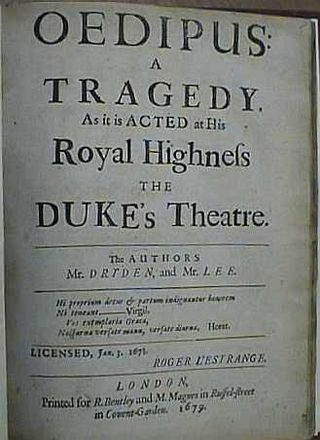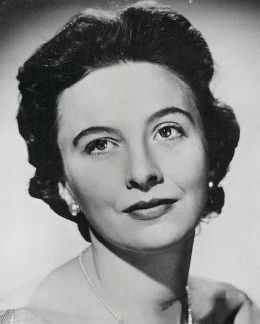Related Research Articles

Henry Purcell was an English composer of Baroque music.

Opera is a form of theatre in which music is a fundamental component and dramatic roles are taken by singers. Such a "work" is typically a collaboration between a composer and a librettist and incorporates a number of the performing arts, such as acting, scenery, costume, and sometimes dance or ballet. The performance is typically given in an opera house, accompanied by an orchestra or smaller musical ensemble, which since the early 19th century has been led by a conductor. Although musical theatre is closely related to opera, the two are considered to be distinct from one another.

William Boyce was an English composer and organist. Like Beethoven later on, he became deaf but continued to compose. He knew Handel, Arne, Gluck, Bach, Abel, and a very young Mozart, all of whom respected his work.

"Love Divine, All Loves Excelling" is a Christian hymn by Charles Wesley on Christian perfection. Judging by general repute, it is among Wesley's finest. Judging by its distribution, it is also among his most successful.
The history of opera in the English language commences in the 17th century.

Dido and Aeneas is an opera in a prologue and three acts, written by the English Baroque composer Henry Purcell with a libretto by Nahum Tate. The dates of the composition and first performance of the opera are uncertain. It was composed no later than July 1688, and had been performed at Josias Priest's girls' school in London by the end of 1689. Some scholars argue for a date of composition as early as 1683. The story is based on Book IV of Virgil's Aeneid. It recounts the love of Dido, Queen of Carthage, for the Trojan hero Aeneas, and her despair when he abandons her. A monumental work in Baroque opera, Dido and Aeneas is remembered as one of Purcell's foremost theatrical works. It was also Purcell's only true opera, as well as his only all-sung dramatic work. One of the earliest known English operas, it owes much to John Blow's Venus and Adonis, both in structure and in overall effect.

Albion and Albanius is an opera, closely resembling a French tragédie en musique, by Louis Grabu with an English libretto by John Dryden.

King Arthur, or The British Worthy, is a semi-opera in five acts with music by Henry Purcell and a libretto by John Dryden. It was first performed at the Queen's Theatre, Dorset Garden, London, in late May or early June 1691.
Nicola Frances LeFanu is a British composer, academic, lecturer and director.

Venus and Adonis is an opera in three acts and a prologue by the English Baroque composer John Blow, composed no later than 1684 and no earlier than 1681. It was written for the court of King Charles II at either London or Windsor Castle. It is considered by some to be either a semi-opera or a masque, but The New Grove names it as the earliest known English opera.

The Fairy-Queen is a semi-opera by Henry Purcell; a "Restoration spectacular". The libretto is an anonymous adaptation of William Shakespeare's comedy A Midsummer Night's Dream. First performed in 1692, The Fairy-Queen was composed three years before Purcell's death at the age of 35. Following his death, the score was lost and only rediscovered early in the twentieth century.
The terms "semi-opera", "dramatic[k] opera" and "English opera" were all applied to Restoration entertainments that combined spoken plays with masque-like episodes employing singing and dancing characters. They usually included machines in the manner of the restoration spectacular. The first examples were the Shakespeare adaptations produced by Thomas Betterton with music by Matthew Locke. After Locke's death, a second flowering produced the semi-operas of Henry Purcell, notably King Arthur and The Fairy-Queen. Semi-opera received a deathblow when the Lord Chamberlain separately licensed plays without music and the new Italian opera.

Dioclesian is an English tragicomic semi-opera in five acts by Henry Purcell to a libretto by Thomas Betterton based on the play The Prophetess, by John Fletcher and Philip Massinger, which in turn was based very loosely on the life of the Emperor Diocletian. It was premiered in late May 1690 at the Queen's Theatre, Dorset Garden. The play was first produced in 1622. Choreography for the various dances was provided by Josias Priest, who worked with Purcell on several other semi-operas.

"Music for a While" is a da capo aria for voice, harpsichord and bass viol by the English Baroque composer Henry Purcell.
Norma Burrowes is an Irish coloratura soprano, particularly associated with Handel and Mozart roles.
Sir Jack Westrup, FBA was an English musicologist, writer, teacher and occasional conductor and composer.

Dido, Queen of Carthage was an opera in three acts by Stephen Storace. Its English libretto by Prince Hoare was adapted from Metastasio's 1724 libretto, Didone abbandonata, which had been set by many composers. Storace's opera premiered on 23 May 1792 at The King's Theatre in London combined with a performance of his masque, Neptune's Prophecy. The story is based on that of Dido and Aeneas in the fourth book of Virgil's Aeneid. The opera was not a success and was never revived after its original run of performances. The score has been lost.

Baroque music of the British Isles bridged the gap between the early music of the Medieval and Renaissance periods and the development of fully fledged and formalised orchestral classical music in the second half of the eighteenth century. It was characterised by more elaborate musical ornamentation, changes in musical notation, new instrumental playing techniques and the rise of new genres such as opera. Although the term Baroque is conventionally used for European music from about 1600, its full effects were not felt in Britain until after 1660, delayed by native trends and developments in music, religious and cultural differences from many European countries and the disruption to court music caused by the Wars of the Three Kingdoms and Interregnum. Under the restored Stuart monarchy the court became once again a centre of musical patronage, but royal interest in music tended to be less significant as the seventeenth century progressed, to be revived again under the House of Hanover. The Baroque era in British music can be seen as one of an interaction of national and international trends, sometimes absorbing continental fashions and practices and sometimes attempting, as in the creation of ballad opera, to produce an indigenous tradition. However, arguably the most significant British composer of the era, George Frideric Handel, was a naturalised German, who helped integrate British and continental music and define the future of music in the United Kingdom.

April Rosemary Cantelo was an English soprano. She created roles in operas by major composers, including the title role of Semele by John Eccles, Helena in Britten's A Midsummer Night's Dream, and in several works by Malcolm Williamson such as English Eccentrics.

Dennis Drew Arundell OBE was a British actor, librettist, opera scholar, translator, producer, director, conductor and composer of incidental music.
References
- Price, Curtis Alexander (1984). Henry Purcell and the London Stage. Cambridge: Cambridge University Press. ISBN 9780521238311 . Retrieved 13 February 2024.
- Savage, Roger (1995). "The Theatre Music". In Burden, Michael (ed.). The Purcell Companion. London: Faber and Faber. pp. 313–383. ISBN 9780571163250 . Retrieved 13 February 2024.
- Shay, Robert (2002). "Dryden and Purcell's King Arthur: Legend and Politics on the Restoration Stage". In Barber, Richard (ed.). King Arthur in Music. Woodbridge: D. S. Brewer. pp. 9–21. ISBN 0859917673 . Retrieved 14 February 2024.
- Simpson, Roger (2008). Radio Camelot: Arthurian Legends on the BBC, 1922–2005. Arthurian Studies, 70. Woodbridge: Boydell & Brewer. ISBN 9781843841401 . Retrieved 14 February 2024.